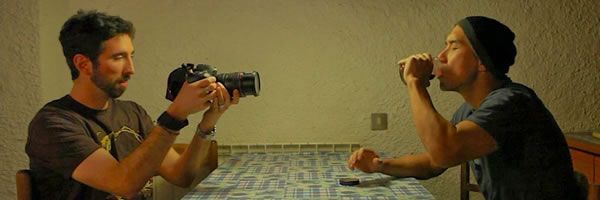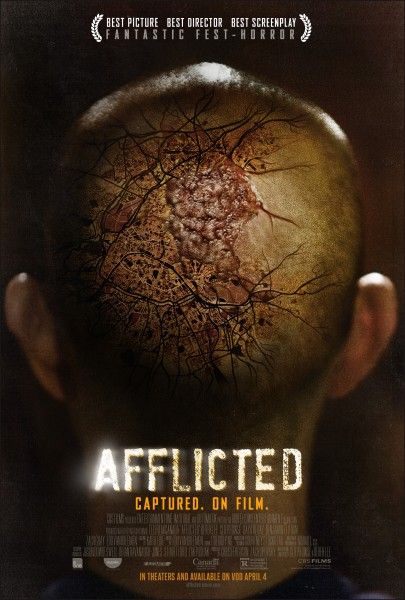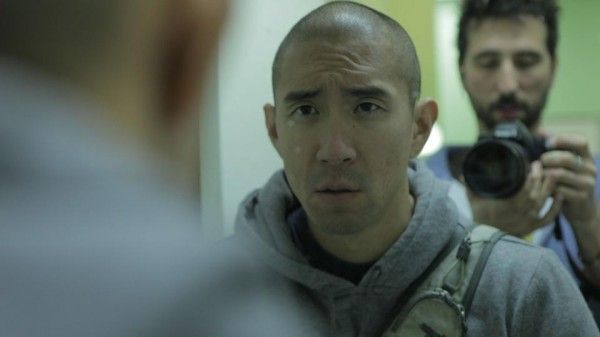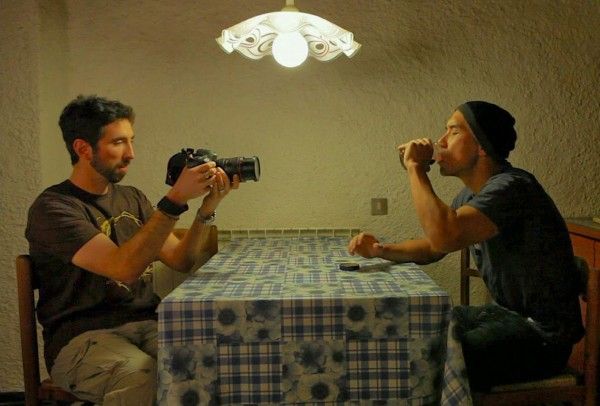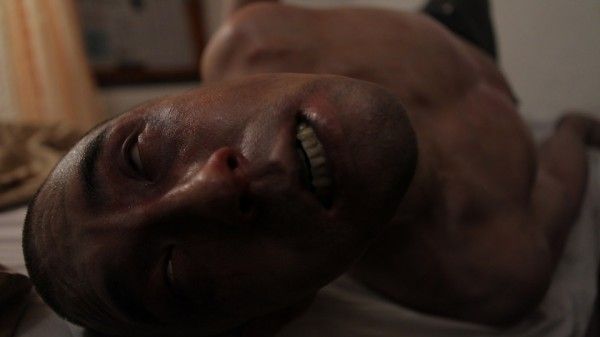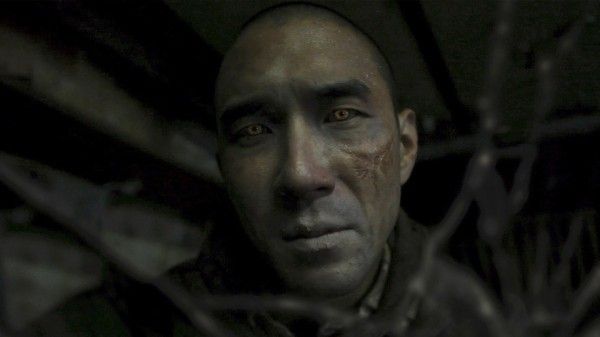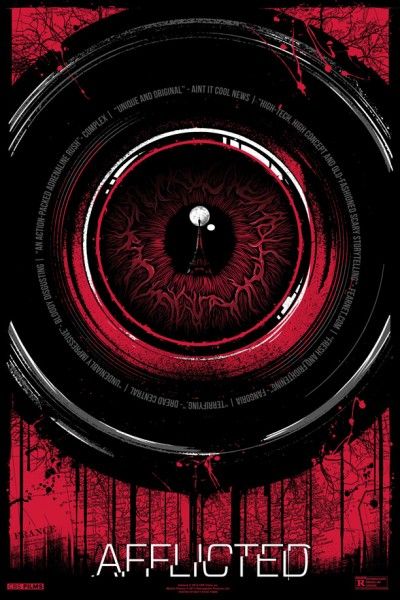Arriving in theaters and on VOD this week is Afflicted. The film stars Derek Lee and Cliff Prowse, real life best friends who also co-wrote and co-directed, as semi-fictional versions of themselves. The pair sets out to document a year spent traveling around the world, but their dream vacation takes a dark turn when Derek wakes up with a mysterious ailment and the pair must discover the origin of the disease before it consumes him.
At a recent Los Angeles press day I sat down for an exclusive interview with Lee and Prowse. They talked about their creative partnership, why they wanted to do a documentary style film, reinvigorating tired subgenres, shooting on location in Europe, utilizing all the formats found footage has to offer, and more. Check out what Derek Lee and Cliff Prowse had to say in our Afflicted interview after the jump. Please be aware there are some spoilers.
Obviously one of the really interesting hooks about this movie is that you two wrote, directed and acted in it, you're real life best friends, you've been making movies together forever- you even have some of your old films snipped into the beginning, talk a little bit about how you guys when from being kids shooting little Kung Fu movies together to where you're at today.
DEREK LEE: [Laughs] I think that is the evolution of it. We saw Desperado by Robert Rodriguez and we thought it was the greatest thing in cinematic history so we stated doing spoofs of that where we all played fake Mexicans and beat each other up. Then I guess right around college Cliff started volunteering in films as a PA, just to get whatever job he could get. He called me up one summer and he was like, "Hey you want to make another movie?" And I was like, "Yeah, sure." He's like, "Yeah, but let's make a real movie." I said, "What does that mean?" He's like, "Do you have any money?" And [I did], so we put together some cash and we shot a film on 16mm. It occurred to Cliff long before me that we could actually do this for a living eventually, so then four short films later, which each got bigger and bigger and bigger and more wild- to the point where our last short film was like a 70 person crew, three cameras, stunt rigging, the whole nine yards. That's the point where we were felt we gone as far as we need to with short films. I mean, you can always do more, but it was kind of the point where we needed to dip into the feature film world in order to make a real splash. We eventually came up with this idea that we could shoot for an amount of money we could raise ourselves and it ended up working out [Laughs].
Beyond the budget, talk a little bit about where the idea for the film came from for you guys. How'd you settle on this concept?
CLIFF PROWSE: Like Derek said, we'd been working for about ten years making short films and sort of building up and we thought okay now's the time to do a feature. We had written a script that was for almost a Bourne Identity style action movie and we realized nobody knows who the hell we are, nobody's going to give us millions and millions of dollars to do that, so lets try to come up with a new idea for an amount of money we could raise ourselves. It really was a brainstorming session where we threw out "supernatural horror documentary" and we thought we could execute that.
LEE: It became really exciting to sort of look at really overused, saturated ideas and put it through the documentary found footage lens and we got really excited about-
PROWSE: Re-imagining that creature.
LEE: Making it feel real. Making it feel scary again. Making the curse element sort of the focus. There's no easy way out, there's no cheating the system and all the sudden this was a character driven, heart felt, but still fun and technically possible film that we could shoot for less than a million dollars. That’s a huge step for us, and then we had the insanity/balls to say, "Lets shoot this on location in Europe."
PROWSE: I think we also got obsessed with the idea of making it as real as possible. We feel this is technically not a found footage movie, because this movie edited very specifically by the characters in the movie, but movies in that aesthetic, the ones that work the best are the ones that you really are able to suspend your disbelief and the people feel like actual people in actual situations. We just became obsessed with how to we make this feel more real and that led to- Derek's not going to play a character, Derek should play himself. Derek should have a friend, that friend should be me. All our friends should be our friends, and our family should play our family, just really, really layering it. If people googled us they'll see we're friends, we did go to high school together, it will really fuck with peoples minds. Hopefully it just gives the whole movie a sense of authenticity that you would never ever be able to get if you created characters from scratch.
LEE: It goes back to what you were pointing out, those videos that we put in the movie of us. You cant get that from any other movie because their history doesn’t really exist. So we just happen to have really embarrassing footage of us fighting each other when we were kids.
PROWSE: So we're like, "Let's just put that in the movie." You know those moments when you're watching a movie and they pick up a picture of themselves as children and it’s the most obviously photo shopped picture ever- we're like, what's amazing is that we have the actual versions of those that will never feel fake.
So for you guys that found footage, documentary style was there from the beginning. It wasn’t a stylistic lens applied to a pre-existing script?
LEE: Yeah, the idea of the creature is so over saturated, so we actually weren't that excited about that. It was only when we put it thorough the lens of found footage, when we were like, "Oh, but what if it were real? What if it were scary? What if it were biological and horrible?" All the sudden now we got excited again. Now it's a horror film. It's not just pretty people being pretty.
PROWSE: Yeah, the same story told in regular cinematic language we didn't find nearly as compelling as one that felt like everything about the aesthetic and feel of the movie feels real and then we introduce that supernatural element in it. We thought that was cool.
Something I thought was cool about your approach to the found footage angle- it's funny because now it's a subgenre that has subgenres, and you kind of hit them all through the course of the movie. It starts in the faux documentary, almost like Travel Channel or Food Network-
PROWSE: Yeah!
LEE: Exactly, that's right.
Then it becomes more of your traditional found footage of a couple people filming each other, then it's single camera POV almost first person shooter style. Was that an intentional construction for the film to kind of devolve?
PROWSE: Absolutely. We really wanted at the beginning to feel fun, have a sense of polish. They use music. It’s something that they're posting to their friends and family in a fun way and sending it back home. Then as the situation gets more and more dire, that gets stripped away, it becomes a lot more gritty and unpolished, and then by the end, like you said, it's just holding onto the camera for dear life. There's no polish, there's nothing at all except the rawness of the material, and absolutely it follows the emotional trajectory of the film.
LEE: It’s funny too, like you said, the opening is a travel buddy film. The middle frame is the classic horror; jump scares, creepy moments and body transformations, stuff like that. Then the third act of the movie is essentially just action, wall to wall stunts and gunfire, stuff like that. We really wanted to take the audience on that journey. It's a lot of fun sort of adapting how the camera is being used, feeling the intentionality of the person holding it, because for us it was a big deal to justify why the camera was rolling. The beginning was super easy, the middle was about Cliff being this huge documentarian, and the end it was just recording the last moments of life on earth [laughs]. So there's always this huge imperative and it's fun to adapt as we go.
Can you talk a little bit about the fact that you are both directing and acting at the same, the challenge that comes with trying to execute both of those jobs at the same time and how you worked around the issue?
LEE: Yeah, one of the first things we learned right off the bat is that it's very, very difficult tot give a genuine performance while holding a camera on the other actor and trying to be aware of the framing of it. Even just the weight of holding a five pound object in front of your chest prevents the way you speak, it changes how everything feels. So that was just one of the weird mechanical things we figured out right away. Then there's the issue of if I'm on camera and Cliff's holding the camera, but Cliff's supposed to be giving me lines because we're interacting, he's not supposed to be evaluating me as a fellow actor, but he has to because he's the director. So more often than not Cliff was just sort of throwing out lines at the right timing and I'd have to sort of fill in the blanks in terms of the emotion of it and vice versa. It was really brutal that way. Luckily we could mess with it in post production and sort of do some additional audio recordings. The really tough ones were the ones where we're both in the scene, because then you've got two directors in the scene, we're not supposed to evaluate each other because that's not fair to each other as actors, and we throw our hearts into the scene and have to go back, stop production, review, "Is it good? I don’t know, I thought I was terrible." Okay, go back and do it again. That takes time and its awkward, but eventually you get through. We got better at it as we went on.
PROWSE: There are times too where our director of photography is holding the camera- it was always a process of are we actually going to hold the camera here, or is he going to hold the camera? And if no one was holding the camera that would actually give me the ability to act [laughs] instead of as Derek said, just throw out lines.
I'm always curious about creative duos and partnerships, at this point when it comes to writing, directing, day to day operations, do you have set roles that you play? Do you mix it up? How does it work for you guys?
PROWSE: The funny thing is that because we've been doing it for so long- when you're fifteen and making a movie together everyone's writing, everyone holds the camera, everyone's directing, everyone's acting. We learned the process of filmmaking together doing that, so it's evolved that way. In terms of the writing, we'll sit in a room together. There were times on this one where it was like we mapped it all out together and then literally I'm standing over Derek's shoulder as he's typing every single exterior, driving him crazy. Then there were other times we'd talk about it and I'd go off and sketch out the movie and Derek would go off and write the pages. We also tried, which is really important, when you're a duo for the crew you still need to have one vision, you can't have two visions. So luckily we've been working together, we have very similar sensibilities, and then we’d go over and make sure we knew exactly what we wanted to do the night before, talk about all that stuff so when you got to set there's no surprises [laughs].
LEE: It is a really interesting byproduct of being co-directors and co-writers is that we could never let our egos take over because we're only ever 50% of any decision, not 51%. We can't make a unilateral decision at all, so no matter what idea I have, no matter how smart I think I'm being, I have to convince at least one other person and if cliff disagrees with me it forces me to really break down and analyze what I want and why. Not only do I have to know that, I have to be able to communicate it and convince Cliff and vice versa. So that means every idea in the movie, for better or worse, is at least two people, through possibly hours of butting heads, finally going, "Okay we think this is the right way to go." I think it's elevated both of us as thinkers, as writers, and as directors. It's a very cool process.
You mentioned that you guys were crazy enough to shoot on location. Talk a little bit about what that process was like for you guys. Were you able to bring your own crew?
LEE: We brought a very small Canadian crew, core of about seven people, including us. So camera, DP, makeup artist, a sound guy who actually was our editor, basically it was a tiny film summer camp we like to call it. Then we brought a stunt team over for a very limited amount of stunt days. But it was awesome. It was such a wicked experience. To the point where people were like, "Can I come to? We heard you guys are shooting this movie in Europe." We're like "We'd love to, we can't afford it." Travel expenses were a big part of our budget. It was a blast. To be able to shoot your first feature film as an action horror film on location in Western Europe as bunch of North Americans- if you told us that was the plan, I'd have said you were lying. For how much money? You're lying.
PROWSE: And that was also sort of a function of the concept, because once we knew that this story was best told in the documentary style, that’s something you can do with a lot less people and gear, so all the sudden you're much more mobile and even though we didn’t have a big budget we could afford to fly seven people over. That was hugely exciting because you're putting all that money on screen. You're getting the scope of the film and you get this really interesting transition from beautiful, aspirational European vacation that everyone would love and beautiful bright day time colors to "Oh my god, we’re thousands of miles away from home completely isolated in a place where we don’t speak the language, just the two of us and this is terrifying." That lent a lot to the story.
Please be aware there are significant spoilers below this point.
Talk about your approach to vampirism in the film, why that was the angle that appealed to you and what sort of research you did to bring your own spin to such a well explored genre.
LEE: We made a conscious decision from the beginning that what we wanted to do was bring that lens of reality to something as over saturated as the vampire and said to ourselves, "What would it really look lie if this creature were around and how would we react as people?" So what we focused on was to make it feel like a vampire was the alpha predator above humans and focus all the supernatural abilities on what it means to hunt people- so strength, speed, night-vision, healing. The only concession we made to the weirder stuff was the skin burning, because you can't get rid of that, but as cliff points out it's more of an allergy to the sun, an extreme bubbling of the skin instead of bursting into smoke and flame and hell fire. Then there's the drug addiction thing too, so we definitely looked at drug withdrawal, what it does to the mind and the body and focused on that, because needing blood very well translates to heavy drug use.
PROWSE: Yeah, we talked about the idea of a biological imperative to consume human blood, that’s what it should feel like, and the longer you went without blood the more your body would transform you and your conscious mind starts to disappear and instinct starts to take over.
LEE: And the curse part of it too. So there's no animals, there's no blood bank, because we felt the murder was intrinsic feeling trapped. If you have to live forever it's a good thing, but you if have to live forever constantly killing people, there's no way out of it. So we were very conscientious of saying it has to be fresh, has to be human and you get that suffocating feeling of there really is no way to turn this into a positive spin. It's just bad.
PROWSE: Yeah, that had to be the moral fork. The fork had to be that you're super strong, you're super fast, you're going to live forever, but there is not a doubt for a second hopefully by the end of the movie that if he could stick that shotgun in his mouth and blow his head off he would, because this is a fate worse than death. The movie ultimately is about him not being able to reconcile his former human life and morality with what he's become. He just can't understand how this is what he is and it ends up costing his friend his life.
LEE: I was going to say I don’t think anyone would choose to be our kind of vampire, but that's probably not true [laughs].
PROWSE: That's probably not true [laughs].
LEE: There are people out there.

